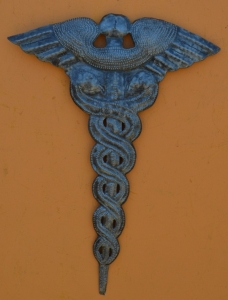Voodoo Priests and M.D.s : Finding the right mix in Haiti
More than 5 years after the earthquake that devastated Haiti, many of the physical wounds have healed, but much of the psychological wreckage lingers. Because voodoo culture is so pervasive -with an estimated 70 percent observing its practice – mental health care as a medical concept never really took hold and no system for clinical treatment was ever really established. Haitians who are in a state of mental suffering are likely to believe themselves to be possessed and seek the ministrations of a voodoo priest or priestess whereas their condition might otherwise be clinically diagnosed as depression, psychosis or other mental illness. (Read more in the Huffington Post.)
Because of the prevalence of its practice, ignoring the influence of Voodoo with regard to mental health care would be a recipe for disaster. In a paper published in 2010 by the World Health Organization and the Pan American Health Organization entitled, “Culture and Mental Health in Haiti: A Literature Review,” the authors state that, “Voodoo encompasses the promotion of personal well- being, prevention of illness, and healing.” Practitioners of Voodoo believe that the health or illness of a particular person depends on his or her connection to tradition and place in the social and moral order as well as his/her relationships with the gods and ancestors. Voodoo and personal health are so intertwined that believers would not accept treatment of which Voodoo is not a part.
Moreover, the common strategy of seeking out a voodoo priest rather than a doctor of psychiatry is also a practical one. In Haiti, with its

The Rod of Asclepius – a universal symbol of the medical profession – is artfully recreated in Haitian metal by Patrick Bernard.
population of 10 million, there are an estimated 60,000 hougans and mambos. There are only 10 psychiatrists.
Max Beauvoir, a high-ranking Voodoo hougan is emphatic that Voodoo must play a role in the development of a comprehensive therapeutic model. As he sees it, “Voodoo is the soul of the Haitian people. Nothing can be achieved if we work without that cultural basis.”
Enter Akwatu Kenti, head of the Centre for Addiction and Mental Health’s Office of Transformative Global Health. He along with Catholic, Protestant and Voodoo leaders are seeking an approach that blends tradition perceptions and cultural influences with clinical practices. His goal for the collaboration is that the shared wisdom of the participating clinicians and spiritual leaders will result in a state of elevated mental health for Haiti’s population as a whole.
It seems a set of ingredients that will be tricky to blend. But whoever came up with mixing yeast, sugar, flour and milk for the very first time? And now we have bread.
Contributed by Linda for It’s Cactus

